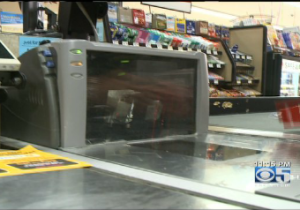Is 98% Price Accuracy Acceptable For Grocery Stores?

(CBS 5)
This is what we’re left wondering after seeing the latest investigation by CBS 5 in San Francisco into an apparent overcharging problem at Safeway stores.
As we told you about in November, undercover reporters were not only being overcharged at Safeway stores, but many of these stores were in violation of a court order requiring them to either give the customer the overcharged item for free or a $5 gift card.
A new investigation of various inspection records found that customers are overcharged on 1 out of 50 items purchased at a Safeway or Safeway-owned store (including Vons, Dominick’s Finer Foods, Randall’s and Tom Thumb).
Safeway counters that this rate of overcharges is “squarely within industry norms,” and cites the California Dept. of Food & Agriculture’s 2011 Statewide Price Verification Survey. Indeed, that survey [PDF] did find a statewide average of 1.97% in overcharges for all the retail businesses surveyed. Grocery stores demonstrated a slightly higher rate (2.15%) but still close to the 1-in-50 number CBS 5 found for Safeway.
“[W]e would never be satisfied with just being average when it comes to pricing accuracy,” writes Safeway in response to the CBS report, adding, “indeed, we are confident that our actual performance is even better than the 98% accuracy rate you attribute to Safeway.”
Safeway attributes the pricing errors to the large variety of items it sells. A rep for the Federal Trade Commission tells CBS that while “complexity creates problems… you know you don’t need to be NASA or the CIA to figure out how to get the prices right.”
It’s worth pointing out that grocery stores were not even the worst overchargers in the Price Verification Survey. Auto parts and supply, health and nutrition stores, postal and office supply, electronics and appliances, and drug stores all demonstrated higher rates of overcharging customers.
Safeway claims that has a “strict set of policies and systems” to minimize pricing errors, including self-auditing of stores. And yet it’s been sued twice in the last decade by the state of California for overcharging. So either it’s not doing enough or there is a limit to how accurate grocery stores can be.
What’s more important — and more easily remedied — is how stores train employees to handle overcharges. As demonstrated by November’s undercover report, workers and managers at the Safeway stores involved were either unaware of or misinformed about the company’s court-ordered policy of refunds for overcharged items.
Not only should every employee from the manager on down be fully versed in this policy, it should actually be the policy at stores regardless of whether or not the court has ordered it. Minor penalties to the store coupled with rewards for observant customers can only help.
Want more consumer news? Visit our parent organization, Consumer Reports, for the latest on scams, recalls, and other consumer issues.

